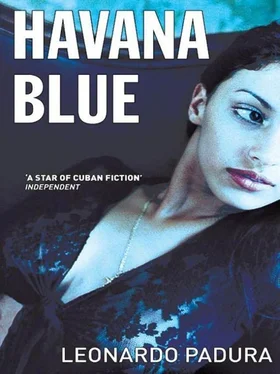“ Saturday 30 – 12 – 88
“Armed Robbery. Retail company Guanabacoa district. Guard seriously injured. Culprits arrested. Closed.
“Attempted murder. La Lisa district. Culprit arrested: José Antonio Évora. Victim: culprit’s wife. In a bad state. Statement: admits responsibility. Motive: jealousy. Closed.
“Armed robbery, Parque de los Chivos, La Víbora, October Tenth District. Victims: José María Fleites and Ohilda Rodríguez. Culprit: Arsenio Cicero Sancristóbal. Arrested 1 – 1 – 89. Closed.
“Murder. Victim: Aureliana Martínez Martínez. Resident at 21, N°1056, e/A and B, Vedado, Plaza District. Motive: unknown. Open.
“Disappearance: Disappearance of Wilfredo Cancio Isla. Case open: possibly drug trafficking. Missing man found in a boarded up house. Accused of breaking into the property. Arrested pending investigation possible drug connections.
“Armed robbery…”
He closed his eyes and pressed his fingertips against his eyelids. The conversation with Jorrín had sharpened the hypersensitivity he’d not lost in all those years on the job and which helped him imagine each case individually. And that list of pointless crimes filled three computer printouts, and he reflected how Havana was turning into a big city. He puffed gently on the cigar the Boss had given him. Recently, he reflected, robbery and assault were on an upward curve, the siphoning off of state goods seemed irrepressible, and trafficking in dollars and works of art had become much more than a passing fashion. It’s a good cigar, but none of this relates to Rafael. Tens of daily reports, of cases that were open, closed or still under investigation, astonishing connections linking a basic illegal beer-bar with an illegal betting shop, and the betting shop with counterfeit petrol vouchers, and the counterfeiting with a consignment of marijuana, and the drugs with a real store offering a selection of domestic electrical goods to purchase with dollars that couldn’t be traced. If only this cigar helped me think, because he needed to think, after he’d told the Boss about his dealings with Rafael Morín and Tamara Valdemira, I had a doggish infatuation for that woman, Boss. “But that was twenty years ago, wasn’t it?” the major asked, and he said: “Forget any idea I might take you off the case. I need you on it, Mario. I didn’t call you this morning for fun. You know I don’t like disturbing people just for the sake of it, and I’m not so romantic as to invent tragedies when they don’t exist.
But this tale of the man who disappeared reeks. Don’t let me down now,” he said, adding: “But be careful, Mario, be careful… Remember there’s a loose end somewhere, and who better than you to find it? OK?”
“What have you come up with, Conde?” Sergeant Manuel Palacios asked, and the Count saw fireflies flying in his eyes born from the pressure from his fingertips.
He stood up, returned to the window and meditated gloomily. It was three hours to dusk, and the sky had turned overcast, a warning perhaps that rain and cold were on their way back. He’d always preferred cold for work, but the premature darkness depressed him and took away any inclination to work that he might still harbour. He’d never before so wanted to be finished with a case, the pressures from above the Boss passed on to him made him feel desperate, and the image of Tamara’s butt shifting beneath her yellow dress was both torture and a warning: be careful. Everybody seemed to see danger. Worst of all, however, was the feeling of disorientation that was stifling him: he was as lost as Rafael and didn’t like working like that. The major had approved his first steps, authorized him to speak to the Spanish businessman and investigate the enterprise – yes, something might turn up there, he’d said – to interview people and check papers with specialists in economics and accounting from headquarters; only he’d have to wait till Monday, and the major didn’t want this to last till Monday. But as he smoked that silken-flavoured cigar he convinced himself that Rafael Morín’s disappearance owed nothing to chance and that he’d have to revisit all paths that might lead logically to the beginning of the end of the story; the party and the enterprise, the enterprise and the party seemed like tracks that ran into each other.
“Tamara rang and told me about something that may be a lead,” he finally told Manolo as he informed him about the telephone book. The sergeant read the names, numbers and addresses of the two women and then asked: “Do you really think this might lead somewhere?”
“I’m interested in Zaida the secretary and in finding out who Zoila might be. Hey, how many names starting with Zed you got in your telephone book?”
Manolo shrugged his shoulders and smiled. No, he didn’t know.
“Zed barely has eight or ten pages in dictionaries, and almost nobody has a name that begins with Zed,” said the Count, opening his own telephone book. “I’ve only got Zenaida. Do you remember Zenaida?”
“Hey, Conde, drop it, that girl’s for other occasions.”
The lieutenant closed his telephone book and returned it to his desk drawer.
“Women are always there for other occasions. Yes, get a move on, we’d better go see the Zeds. Get the car out.”
Saturday night wouldn’t turn out to be at all spectacular. A cold drizzle that would continue into the early hours had begun to fall, and the cold could still be felt in the closed car, and the Count longed for the powerful sun that had accompanied his waking up that morning. The rain had emptied the streets, and a grey pall of apathy shrouded a city that lived for the heat and retreated into itself at the slightest cold or drop of water. The languid tropical winter came and went, even in the space of a single day, and it was difficult to work out the time of year: a shit winter, he muttered as he contemplated the boulevard, darkened by clumps of trees, swept by a wind from the sea gusting along paper and dead leaves. Nobody dared sit on the benches on the path down the centre of the avenue the Count thought the most beautiful in Havana and that was now the exclusive preserve of a gritty individual zipped into his windbreaker and engaged in his evening jogging. What strength of will. On such an evening he would have taken a book to bed and been asleep by the third page. On such an evening, he recognized, the cold and the rain irritated people who were condemned to stay indoors: the most easygoing wives could transform a husband’s slightest macho thrust into an issue of feminine honour and bring down a flowerpot on his forehead, between steaks, quite remorselessly. Luckily tonight the baseball series would resume after the end-of-year break, but he thought how rain might perhaps lead to the game being called off. His team, the Industriales, which kept him awake worrying at night, were playing in the Latinoamericano Stadium against the Vegueros to decide who would go through to the final championship playoff, because Havana had already qualified. He would have liked the chance to go to the stadium: he needed the group therapy that seemed so much like freedom, where you could say anything, calling the referee’s mother a whore or even your team’s manager a fucking idiot and then depart sad in defeat or euphoric in victory but relaxed, hoarse and raring to go. Recently the Count was scepticism incarnate: he even tried not to go to baseball games because the Industriales played worse and worse, and luck seemed to have forsaken them, and apart from Vargas and Javier Méndez, the rest seemed second-raters, too weak in the leg to really get them into the final, let alone win it. He had forgotten Zaida and Zoila by the time they drove out on the Malecón. There a briny drizzle met a heavenly shower, and Manolo cursed his fucking luck, thinking he’d damned well have to wash the car before putting it away for the night.
Читать дальше











